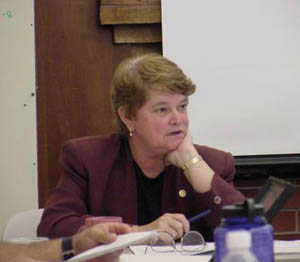Course in Systems Design Introduced
|
“In the practice of dispute resolution, an evolution – some would say a revolution – is occurring. The field has moved well beyond the settlement of individual disputes to a growing phenomenon called the ‘integrated conflict management system,’ which represents a comprehensive, systems approach to the prevention, management and resolution of conflict,” writes Jennifer Lynch in her article, Beyond ADR. Professors Maude Pervere and Stephanie Smith taught students about this evolution in the practice of dispute resolution in the seminar, Conflict Resolution Systems Design.
The course gave students the opportunity to explore the emerging field of dispute resolution systems, to examine their design and to evaluate how well they function. Pervere explains, “Conflict is a natural and inevitable aspect of all change. Lawyers are well-positioned to see patterns of troubling conflicts, and to help clients respond to conflict not only on a case-by-case basis, but also in a systematic way.”
In the United States, people often turn to the formal legal system to resolve conflicts. In certain areas of the law, both lawyers and clients are finding that traditional legal solutions may not serve the interests of the parties involved. The financial, emotional and time costs of litigation are high, and the needs of the parties may not be well served by the remedies that are available. According to Pervere, “Often even the best results in individual cases have little effect, because the context that gave rise to the conflict is not changed.”
In response to some of these concerns, lawyers have turned to using alternative dispute resolution (ADR), like mediation or arbitration, to help meet their clients’ needs. Many companies and other entities are implementing dispute resolution and conflict management procedures that are aimed at resolving conflicts at the earliest possible stages, when issues are often easier to resolve. Students in the Systems Design Seminar studied the approaches to early conflict management in entities as varied as the World Trade Organization, the (San Francisco) Bay Conservation and Development Commission, the Kaiser Foundation Health Plan, and the U.S. District Court for the Northern District of California.
Students learned that systems ideally 1) provide options for preventing, identifying, and resolving a wide range of problems, 2) through multiple easy access points, including rights-based options in the traditional legal system; 3) with the systemic support necessary for coordinating resources and promoting competence in dealing with conflict, so as to 4) foster a culture that welcomes good faith dissent and encourages both early resolution of conflict and continuous institutional learning and change.
 |
Sheila Kuehl, California State Senator, speaks
to the Systems Design Class. |
The Systems Design Class began by examining some common elements of conflict resolution systems, including the ombuds role, mediation, arbitration, and court systems. Guest speakers like ombudsman Howard Gadlin from the National Institutes of Health and California State Senator Sheila Kuehl talked about how the elements worked within systems, and raised issues about the use of certain elements. Next, the class used case studies to examine the functioning of more complex systems. Professor Frances McGovern spoke on comparative claims resolution facilities, touching on the September 11th Victims’ Compensation Fund. Among other topics, the class explored the role of stakeholder involvement, structural incentives, transparency, and realistic alternatives on both the efficiency and the perceptions of fairness of any system.
The class concluded with presentations of students’ research, each describing and analyzing a different conflict management system. Papers included systems as wide-ranging as the state and community responses to immigration in Catalonia, Home Depot’s hiring and promotion system and Ebay’s conflict resolution “community”.